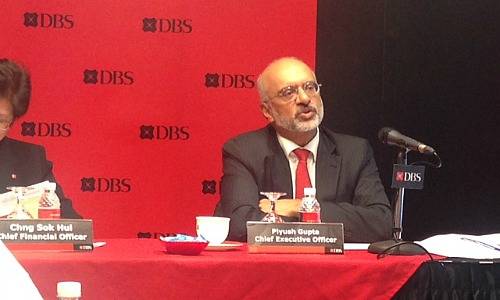The Bank CEO’s now Going all in
Earlier this month Chief Executive of J.P. Morgan, Jamie Dimon, forked out a cool $25 million for 500,000 shares of the U.S. banks stock. What does that mean?
In Singapore last week Piyush Gupta, the CEO of DBS Bank, purchased 200,000 DBS shares for close to $2.8 million. Jes Staley, the Chief Executive of Barclays, has also spent an eye watering $8.3 million buying shares in the U.K. bank.
Seeing the CEO’s putting their substantial amounts of money where their collective mouths are is somewhat new, refreshing and reassuring for the bank clients and stakeholders. Of course they also have one thing in common they believe their banks are undervalued, which with hindsight may or may not be the case.
Piyush Gupta's Vision
In the case of Gupta he believes the market panic that has been playing out since the beginning of the year has been overstated, the DBS results one week ago beat market expectations by posting a 20 percent rise in its fourth-quarter net profit to $1 billion.
Indian born Gupta who is now a Singapore citizen, also has a strong vision for his bank to be at the heart of digital banking and has embraced fintech initiatives by the armful. He is confident his initiatives are going to lead DBS to the tip of the banking and technology curve.
Joining DBS from Microsoft
To drive the digital offerings the bank hired Neal Cross as its Chief Innovation Officer who joined DBS via Microsoft and MasterCard Labs, not a typical banking hire by any means.
At the time Gupta said that hire was part of an agenda to get people from a range of different backgrounds. Professionals from design, innovators and people from outside the banking industry to meld them into the structure and create a new model of banking.
With his substantial financial commitment Gupta obviously believes his bank has a bright future under his leadership.
Not Everyone is Buying
However spare a thought though for the beleaguered CEO of Standard Chartered Bank, Bill Winters who didn’t get a bonus for 2015. The CEO instead received so-called long-term incentive plans tied to his performance between 2016 and 2018, linked to the strategic plan laid out in November 2015 to cut risk, boost capital and profitability.
Last week his bank reported its first full year loss since 1989 as revenue slumped, while loan impairments almost doubled to the highest in the bank’s history. The share price took a considerable hit.
Maybe the time is also right for Winters to dig into his savings and buy some Standard Chartered stock.




























